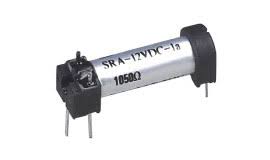Subminiature Relays
Typical mechanical relays are designed for switching relatively large currents. They come with either dc or ac coils. Dc-actuated relays typically come with excitation-voltage ratings of 6, 12, and 24 V dc, with coil resistances (coil ohms) of about 40, 160, and 650 Ω, respectively. Acactuated relays typically come with excitation-voltage ratings of 110 and 240 V ac, with coil resistances of about 3400 and 13600 Ω, respectively. Switching speeds range from about 10 to 100 ms, and current ratings range from about 2 to 15 A.
Miniature Relays
Miniature relays are similar to subminiature relays, but they are designed for greater sensitivity and lower-level currents. They are almost exclusively actuated by dc voltages but may be designed to switch ac currents.They come with excitation voltages of 5, 6, 12, and 24
V dc, with coil resistances from 50 to 3000 Ω.
V dc, with coil resistances from 50 to 3000 Ω.
 Reed Relays
Reed Relays
Two thin metal strips, or reeds, act as movable contacts. The reeds are placed in a glass encapsulated container that is surrounded by a coil magnet.When current is sent through the outer coil, the reeds are forced together, thus closing the switch. The low mass of the reeds allows for quick switching, typically around 0.2 to 2 ms.These relays come with dry or mercury-wetted contacts. They are dc-actuated and are designed to switch lower-level currents, and come with excitation voltages of 5, 6, 12, and 24 V dc, with coil resistances around 250 to 2000 Ω. Leads are made for PCB mounting.













0 comments:
Post a Comment